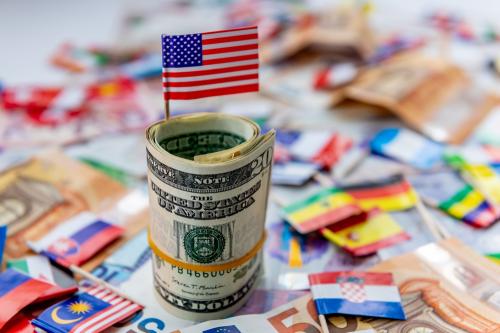

9:30 am EDT - 11:00 am EDT
Past Event
Trading under the African Continental Free Trade Area (AfCFTA) began earlier this year, with massive potential to boost inclusive economic growth and reduce inequality and poverty in Africa. Indeed, the World Bank predicts that 30 million Africans could be lifted out of extreme poverty, while incomes could rise by $450 billion by 2035. Exports could increase by $560 billion, while wages may increase by 10.3 percent and 9.8 percent for unskilled and skilled workers, respectively. The AfCFTA is not a panacea, though, and new complex challenges (e.g., COVID-19 and climate change) have exposed the vulnerability of social and economic systems across the world, highlighting their interconnectedness and emphasizing the need for collaboration around radical and sustainable solutions.
Thus, many experts believe that the AfCFTA can be an important tool as Africa looks to navigate these complex challenges. Indeed, in terms of addressing climate change-related challenges, the final negotiations over and implementation of the landmark trade agreement are creating opportunities to install and enforce new climate-friendly policies. For example, the AfCFTA can promote environmentally friendly protocols and e-commerce or advance the development of green value chains for minerals. Moreover, the momentum behind a climate-friendly AfCFTA can further bolster green industrialization and encourage investment in green infrastructure that will integrate climate risks and act as a buffer against current polluting infrastructure.
On September 20, the Brookings Africa Growth Initiative co-hosted an event with the United Nations University Institute for Natural Resources in Africa (UNU-INRA) in which panelists explored opportunities for green trade with Europe in the context of the AfCFTA and the new European Green Deal. The discussion delved into contentious issues around the carbon border adjustment mechanism (CBAM) tax and trade laws, while looking at ways in which partnership with Europe can support green value chain development, green technology, and green investment in Africa toward green transformation.
After the program, the panelists took audience questions.
Viewers submitted questions for panelists by emailing [email protected] or via Twitter @BrookingsGlobal by using #GreenAfCFTA.

Moderator

Panelist


Robin Brooks, Ben Harris
August 29, 2024

Sam Boocker, David Wessel
August 23, 2024

Robin Brooks, Peter R. Orszag, William E. Murdock III
August 15, 2024